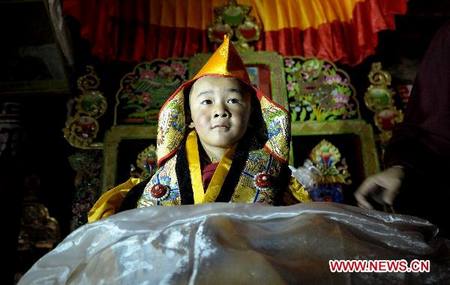Foreign forces must not interfere in Tibetan Buddhism affairs
China has promulgated a regulation on the administration of Tibetan Buddhist temples which stipulates, among others, that overseas individuals or organizations should not interfere in temple affairs.
 |
|
This photo shows the sixth Living Buddha Dezhub at Zagor Monastery in Shannan Prefecture of southwest China's Tibet Autonomous Region, on August 2, 2010. The young Living Buddha, whose secular name is Losang Doje, was chosen by senior monks after a search that lasted several years, according to religious practice and traditions. Bainqen Erdini Qoigyijabu, the 11th Panchen Lama, gave him the religious name Dezhub Jamyang Sherab Palden. [Photo:Xinhua] |
The regulation, issued by the State Administration for Religious Affairs (SARA), will come into effect on Nov. 1.
The regulation, which was made public in a circular on the agency's website, says Tibetan Buddhist temple affairs must not be subject to the control by any overseas individual or organization.
It also states that no individual or organization should use Tibetan Buddhism as a cover to disrupt social order and the state's education system, harm people's health, or infringe public interest and the citizens' legitimate rights.
The circular said some temples' internal management, such as the management of temple staff and financial status, has been in chaos in recent years, and some temples had expanded blindly, incurring financial burdens on local people.
It also said a number of temple staff, under the influence of overseas separatists, were engaged in activities that could sabotage ethnic solidarity and national unity.
Therefore, the administration of Tibetan Buddhist temples should be regulated in a more detailed way, on the basis of China's Regulation on Religious Affairs which took effect in 2005, said the circular.
According to the new regulation, legitimate rights and interests of Tibetan Buddhist temples and their staff would be protected by law.
Lawful activities of the temples will be guaranteed, such as running training courses on Tibetan Buddhist classics, publishing reading materials, accepting donations from domestic and overseas organizations and individuals, and launching philanthropic activities.
The SARA started drafting the regulation since 2008, and has "thoroughly" solicited opinions from representatives of the Tibetan Buddhist circle in Chinese provinces and autonomous regions where Tibetan Buddhists inhabit, said the circular.
Go to Forum >>0 Comments
 Add your comments...
Add your comments...
- User Name Required
- Your Comment
- Racist, abusive and off-topic comments may be removed by the moderator.
 0
0 






